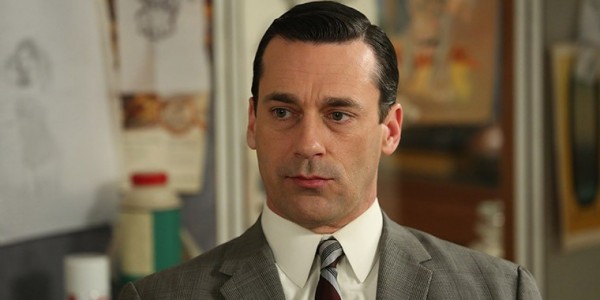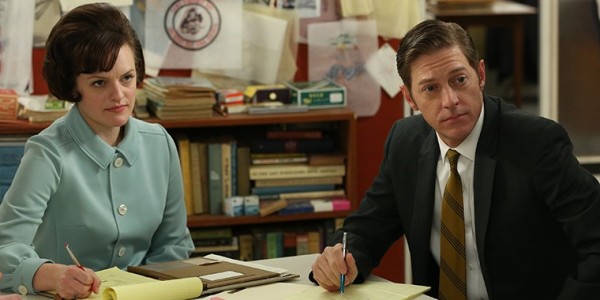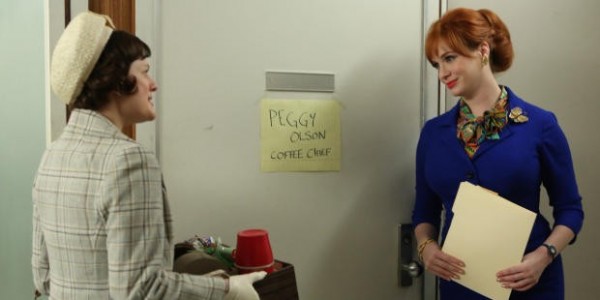“Move forward,” Peggy tells Don in last night’s episode, echoing many viewers’ feelings about the state the character finds himself in time and time again. Don seems to be stuck in a destructive cycle while everyone around him moves on. Even though Don used to be the master of moving on and leaving things (places, people) behind, he somehow manages to repeat his actions and keep coming back to an undesirable position. Surrounding Don is a sea of change; the country is literally in a state of transition (with the upcoming election and impending assassination of RFK), his work situation is in flux, (the merger poses significant change and restructuring) and his personal life has taken an unfortunate turn. Don, obviously threatened by Ted’s capability at the new company (which remains nameless), and confronted with this professional unease and uncertainty, he acts out by finding something he thinks he can control.
Don’s power play with Sylvia is his attempt to assert his power and influence with complete dominance in at least one aspect of his life. He practically sequesters Sylvia into a hotel room and dictates her every action; she eagerly obeys Don’s orders for a while, but soon realizes that it cannot go on forever and that eventually they will have to face reality. She is the one that breaks it off, leaving Don feeling even more impotent and powerless than before. Ted has the upper hand over at the office, and Sylvia shows Don that he really has no control over the people in his life, even if he’d like to think he does. Don is left with nothing to manipulate and when he goes to his reality (home to Megan) he has completely checked out, much like when he let Ted take control with business matters, and he allows Megan to go on about vacation plans without paying attention to her. When news of RFK’s assassination comes to light, Don seems unemotional, desensitized to the horrific event, in stark contrast to Megan who weeps in front of the television. Again he is presented with the unpredictability of the world and the powerlessness of his position and what little he can do to change it.
“Man With a Plan” ends on a down note, with Don’s imminent downfall looming over the series. Despite all his misgivings Don has always been a character that viewers root for, and though it has become harder over the years to do so as he self destructs, viewers have always maintained a glimmer of hope for him. Don has managed to survive thus far somewhat oblivious of his own weaknesses, but now he is definitely aware of his behavior and isn’t doing much to change it. Things are looking grim for Don Draper, but even though the series could take a potentially depressing route, Don’s story is increasingly compelling. The first half of season 4 was quite dark as we saw Don sink into a deep depression until he was forced to make a positive change (the death of Anna Draper served as a turning point for Don). So we have seen Don take matters into his own hands and actively work to make his life more positive, and we know he is capable of such change and growth. This is the first time we have seen him be so dejected and helpless and just accepting of his state, without any kind of hint that he might do something about it. While it is a bit depressing to see our (anti)hero in such a slump, it provides fantastic drama for the show and great material for Jon Hamm to sink his teeth into. It is frustrating to watch Don do some of the things he does, and this episode was no exception; his interaction with Sylvia is done in a way that made the audience uncomfortable and uneasy, and seeing him take a dismissive approach to his work is always frustrating. Some viewers might be upset by the direction the character seems to be taking, but the potential conflicts that could arise from such behavior are infinitely more interesting than a happy Draper marriage or a perfect business record.
While there is a focus on Don’s gloomy life and the episode does end with a melancholy scene, the episode itself is not overly serious; instead it's quite entertaining and enjoyable. It is not the crowd pleaser that was “For Immediate Release,” but it is a good follow up to its fast paced and game changing predecessor. The aftermath of the Don and Ted’s impulsive decision is explored, as both companies have to make compromises and necessary changes in order to succeed in the future. Ted’s role in the series has become more and more intriguing and entertaining as the show progresses, and his extended presence in these latest episodes has made him a dynamic character and certainly one to look forward to. The very first glimpses of Ted, back in season 4, offered a very shallow perspective regarding who the character was; of course he was only there to antagonize Don so he came across as a petty, competitive, and unlikable. The writers have transformed Teddy into a human being who is genuinely interesting and sympathetic. And it seems Ted is usurping Don’s place at the agency (he is even given the signature pan upwards from the feet, striding into the offices of the agency entrance, accompanied by some jaunty music). Don is essentially letting him take over, as Gleason predicted in his talk with Ted, and as we saw as he confidently piloted the plane above the stormy clouds, he seems to be the right man for the job.
If Don continues to sit back and let things just happen before him, without much resistance, it will be interesting to see how the world that surrounds him shapes up. He already is checking out of his current marriage, which will certainly materialize in some conflict involving Megan, but more interesting is the changes to his position in the agency. Will he let Ted take the reigns of the agency and take over? Or will he take Peggy’s advice and find a way to make this merger work amicably and learn some things from Ted? We are halfway through the season so there we a clear direction for Don hasn't materialized, but whatever it is I trust Matthew Weiner and the writers to provide us with great entertainment.

Random Thoughts
-- “What’s wrong with you? Don’t you have any hope?” Ted says to John Mathis (former CGC copywriter) when he mentions he’ll be voting for Nixon. I saw this as a comment on the national sentiment at the time; people were desperate for change and positivity but felt hopless due to the turmoil of the times. It is difficult to maintain hope in a world in which everything seems to be going wrong. RFK’s assassination could be seen as the straw that broke the camel’s back, the moment in which the American people lost faith and resigned to remain as they were. This also mirrors Don’s current state of mind: uncertain and weary of the future, powerless. Nixon did win the election after all.
-- We got a lot of Bob Benson in this episode, and while he is seemingly acting out of genuine concern for Joan, his true intentions are still unclear. Regardless of where his intentions lie, he is here to stay, as Joan does her best to keep him in the agency. Bob Benson will surely be featured more heavily in the season’s second half; the writers have to have something significant involving him planned out.
-- Peggy is stuck with the dreaded column! Poor Pegs, the writers have exhausted the well of column jokes in the previous seasons; I don’t know how much more "column humor" there is to exploit.
-- Roger firing Bert Peterson yet again is both hilarious and awful at the same time. Sterling is always witty and funny, but in the context of this meeting, his quips and jokes are uncharacteristically cruel. Poor Bert, didn’t see it coming.
-- Don’s “olive branch” to Ted is another attempt to manipulate and control something (reminiscent of “Red in the Face,” in which he gets Roger drunk and causes him to publicly embarrass himself) but, like with Sylvia, it only seems to work for a little while, until Ted is able to assert himself and come out on top in their little power play.
-- The screwball cut to Ted and Don on the bumpy plane was a little too slapstick-y for my taste, since it is such an expected joke to make that the predictability robs it of its inherent humor.
-- Pete’s home life is an absolute mess, and while it is interesting to see how they would handle debilitating syndromes like Dementia at the time, I don’t know where this fits into the show. In the episode, Pete’s mother’s presence heightens the sense of pressure he's feeling and how it affects his work; thematically it also ties in with the idea of being weary or opposed to change, getting stuck in the past or in a cycle (like Don).
-- It is so nice to see Peggy and Joan having some bonding time, even if the time is brief; those two have a long history together and it is great to see how their relationship has grown. Once again, Joan shows Peggy into her new work space, much like she did in the pilot episode.